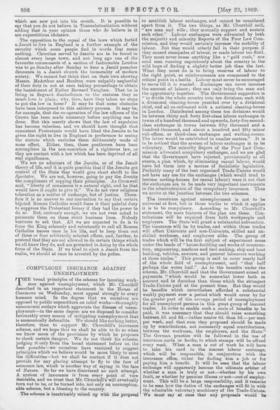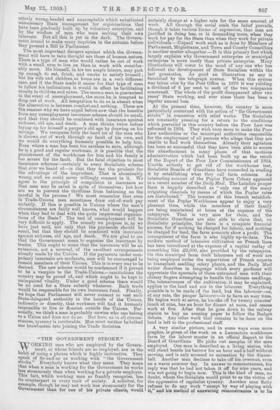COMPULSORY INSURANCE AGAINST UNEMPLOYMENT.
THE broad principles of the scheme for insuring work- men against unemployment, which Mr. Churchill described in an important statement in the House of Commons on Wednesday, must appeal strongly to every humane mind. In the degree that we ourselves am opposed to public expenditure on relief works—thoroughly uneconomic outlays which aggravate the disease of unem- ployment—in the same degree are we disposed to consider favourably every means of mitigating unemployment that is economically defensible. We should like nothing better, therefore, than to support Mr. Churchill's insurance scheme, and we hope that we shall be able to do so when we know more of the provisions by which he proposes to check certain dangers. We do not think his scheme, judging it only from the broad statement before us, the best possible—we ourselves have ventured to suggest principles which we believe would be more likely to meet the difficulties—but we shall be content if it does not provide for any glaring attempt to fly in the face of economic law, which is another way of saying in the face of Nature. So far we have discovered no such attempt. A system of insurance is from every point of view desirable, and we trust that Mr. Churchill's will eventually turn out to be, or be turned into, not only an unexception- able seheme, but a, blessing to the country.
The seheine is inextricably mixed up with the proposal to establish labour exchanges, and cannot be considered. apart from it. The two things, as Mr. Churchill said, "are man and wife ; they mutually support and sustain each other." Labour exchanges were advocated by both the majority and minority Reports of the Poor Law Com- mission, and they would certainly increase the mobility of labour. But they would utterly fail in their purpose if they caused stampedes of labour, or made labour too fluid. They must never cause anything like a 'gold rush," nor. send men running capriciously about the country in the wild hope of finding a slightly better job than the last. What they must do is to bring reserves of labour to the right point, as reinforcements are summoned to the critical point in a battle. Labour must never be encouraged to move till it is wanted. Exchanges can never increase the amount of labour ; they can only bring the man and the opportunity together. The Government suggestion is " to divide the whole country into ten divisions, each with a. divisional clearing-house presided over by a divisional chief, and all co-ordinated with a national clearing-house in London. Distributed among these ten divisions would be between thirty and, forty first-class labour exchanges in towns of a hundred thousand and upwards, forty-five second- class exchanges in towns between fifty thousand and a hundred thousand, and about a hundred and. fifty minor salnoffices, or third-class exchanges and waiting-rooms. The latter would be established in smaller centres." It is to be noticed that the system of labour exchanges is to be voluntary. The minority Report of the Poor Law Com- mission advocated compulsory exchanges, and we are glad that the Government have rejected, provisionally at all events, a plan which, by eliminating casual labour, would have led them into a morass of Socialistic legislation. Probably many of the best organised Trade-Unions would not have any use for the exchanges (which would tend to become sorting-houses for casual labour) were it not that the exchanges are to be made very important instruments in the administration of the compulsory insurance. Thus we arrive at the junction between the two schemes.
The insurance against unemployment is not to be universal at first, but in those trades to which it applies it is to be compulsory. According to Mr. Churchill's statement, the main features of the plan are these. Con- tributions will be required from both workpeople and employers. The State will grant a substantial subvention. The insurance will be by trades, and within those trades will affect Unionists and non-Unionists, skilled and un- skilled workmen, and. employers alike. The group of trades which will be the first subject of experiment come under the heads of "house-building and works of construc- tion, engineering, naachine and tool making, ship and boat building, vehicles, sawyers, and general labourers working at those trades." This group is said to cover nearly half of the whole field of unemployment, and "that half perhaps the worse half." As to the benefits under the scheme, Mr. Churchill said that the Government aimed. at payments "which would be somewhat lower both in amount and in duration than those which the strongest Trade-Unions paid at the present time. But they would be benefits which nevertheless afforded a substantial weekly payment over a period which would cover by far the greater part of the average period of unemployment for all unemployed persons in this great group of insured trades. In order to enable such a scale of benefits to be paid, it was necessary that they should raise something between 5d. and 6d.—rather nearer 6d. than 5d.—per man per week, and that sum they proposed should be made up by contributions, not necessarily equal contributions, between the workmen, the employers, and tho State." The German practice will be followed in the use of insurance cards or books, to which stamps will be affixed every week.. When a man is out of work he will have to take his card to the nearest labour exchange, which will be responsible, in conjunction with the insurance office, either for finding him a job or for paying him a. benefit. It • will be seen that the labour exchange will apparently become the ultimate arbiter of whether a man is truly or not—whether by his own fault, or whether by genuine illness or not—out of employ- ment. This will be a largo responsibility, and it remains to be seen how the duties of the exchanges will fit in with the admirable voluntary machinery of the Trade-Unions. We mut say at once that any proposals would. be utterly wrong-headed and unacceptable which substituted unnecessary State , management for organisations that have been gradually built up by voluntary enterprise, and by the wisdom of men who were serving their own interests. But all this is yet in the dark. The Govern- ment intend to make many inquiries in the autumn before they present a Bill to Parliament.
The most important dangers against which the Govern- ment will have to take thought are these of human nature. There is a type of man who would rather be out of work with a small sum to live on than in work with consider- ably more. He himself, in his too ample leisure, may pick up enough to eat, drink, and smoke to satisfy himself ; but his wife and children at home are in a very different case, and if the State made it easier for that type of man to follow his inclinations it would in effect be facilitating cruelty to children and wives. The more a man is guaranteed in the event of unemployment, the more hole tempted to drop out of work. , All temptation to do so is absent when the alternative is between comfort and nothing. These are the reasons why we have urged before now that the benefits from any unemployment insurance scheme should be small, and that they should be combined with insurance against sickness, old age, and death. A man thinks twice before laying .up for himself a pauper's old age by drawing on his savings. We recognise fully the hard lot of the man who is thrown out of work through no fault of his own, and we would do everything humanly possible to help him. Even where a man has been too careless to save, although he is a good and regular workman, it is possible that the punishment of the workhouse for him and his family is too severe for the fault. But the fatal objection to most insurance schemes—certainly to every Socialistic scheme that ever we heard of—is that they tax the prudent for the advantage of the imprudent. That is abominably wrong, and we could never willingly consent to it. We agree to the principle of compulsion in insurance so that men may be saved in spite of themselves ; but how are we to prevent the thriftless from battening on the careful in the process ? We must remember that even in Trade-Unions men sometimes draw out-of-work pay unfairly. If this is possible in Unions where the men's circumstances are fairly well known, what would happen when they had to deal with the quite impersonal organisa- tions of the State? The test of unemployment will be very difficult to apply. The remedy we propose is, as we have just said, not only that the payments should be small, but that they should be combined with insurance against sickness, old age, and death. We are glad to see that the Government mean to organise the insurance by trades. This ought to mean' that the insurance will be an extension, not a reversal, of the excellent arrangements already made by the Unions. If the payments under com- pulsory insurance are moderate, men will be encouraged to remain members of their 'Unions. This is in every way to be desired. The new scheme would be condemned if it proved to be a. vampire to the Trade-Unions,—institutions the country may be proud of, and which ought to be kept in unimpaired vitality. Under a good scheme there would be no need for a State subsidy whatever. Each trade would be responsible for its own insurance fund. Finally, we hope that Parliament Will never consent to vest such State-delegated authority in the hands of the Unions, indirectly or directly, that workmen will find it humanly impossible to live or flourish outside the Unions. Per- sonally, we think a man is probably unwise who can belong to a Union and does not do so. But here, as in all circum- stances, tyranny is intolerable. Mon must neither be bribed nor browbeaten into joining the Trade Societies.











































 Previous page
Previous page